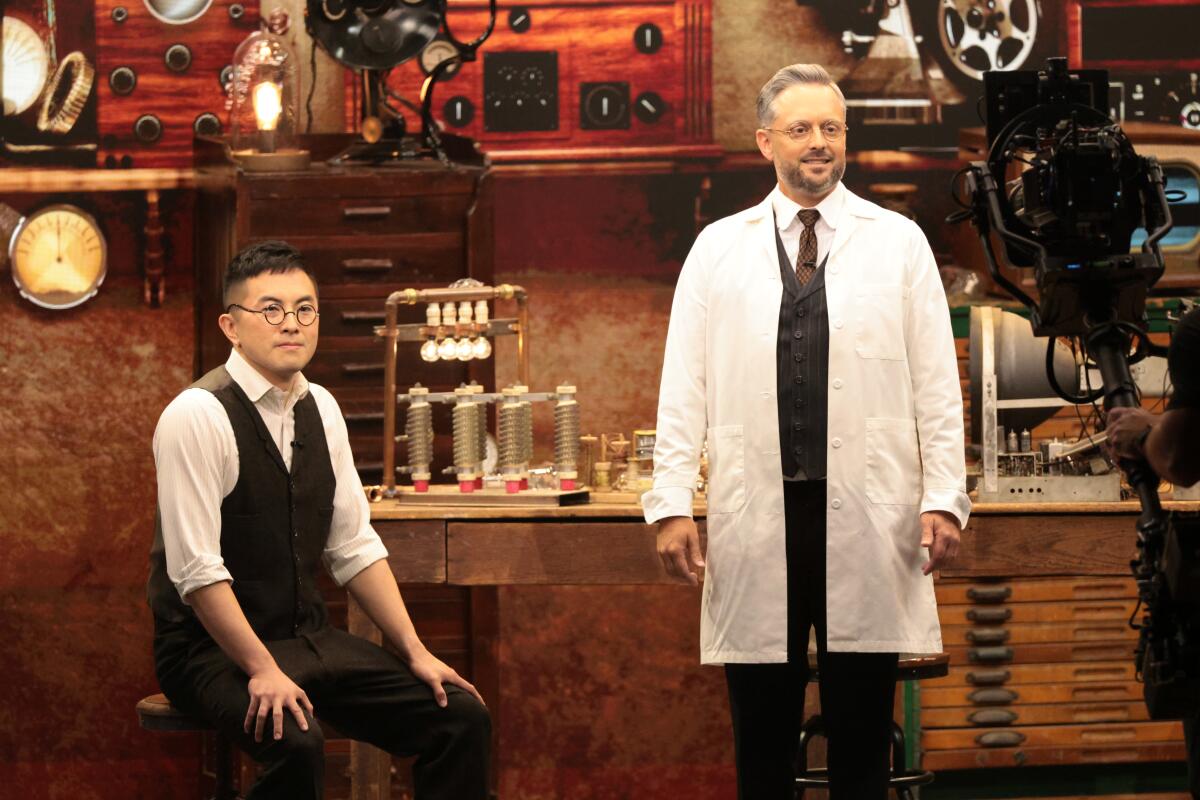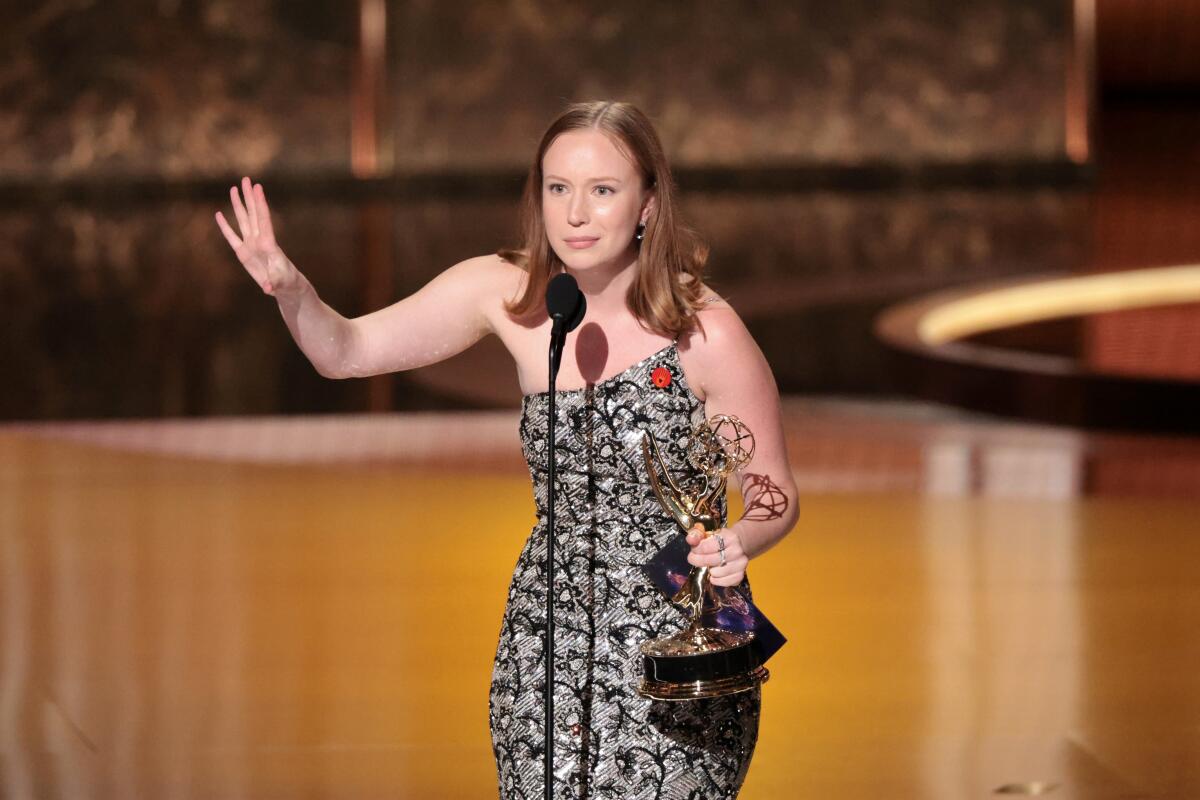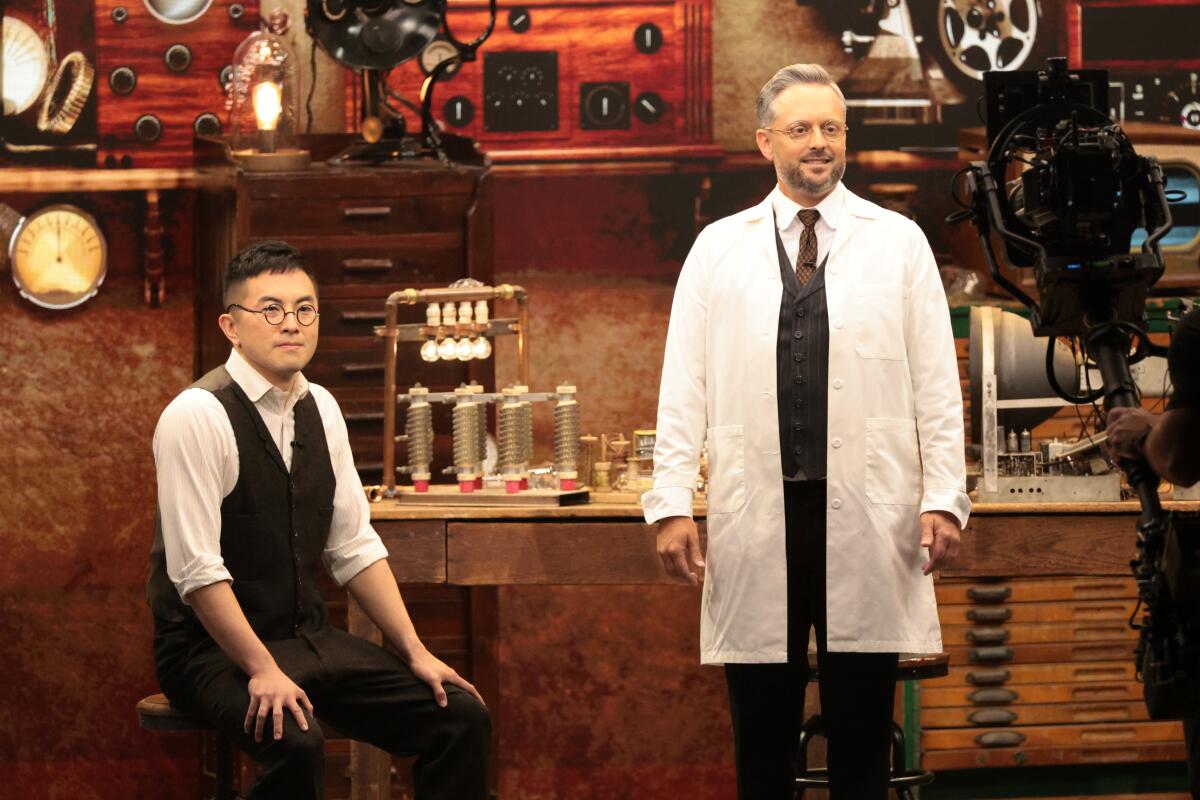There were two questions the 77th Emmy Awards, held Sunday night at the Peacock Theater in downtown Los Angeles, had to answer, other than who would win what. (It’s an honor just to be nominated.)
One was how the show, a glittery evening devoted to the most popular of popular arts, would play against a world gone mad. The other, not distinct from the first, was how first-time host Nate Bargatze would do.
The ceremony is hosted by a round robin of the major networks, and this year the honor fell to CBS, whose corporate overlord, Paramount, has come to represent capitulation to the Trump administration, settling a baseless lawsuit in what is widely viewed as a payoff to grease the wheels of its merger with Skydance and promising to eliminate its DEI protocols. Executive interference in the news department amid an apparent rightward turn has led to the resignations of “60 Minutes” producer Bill Owens and CBS News President and CEO Wendy McMahon. And there’s the cancellation of Stephen Colbert’s “Late Show,” the timing of which some have found suspicious.
But if your goal was to avoid insulted celebrities, social media outrage or petulant notes from the White House, you could have done no better than to hire Bargatze, a clean, calm, classical, noncontroversial, nonpolitical, very funny, very successful comedian. Bargatze, who has been in comedy since 2002, saw his career explode over the last few years; his appeal is not so much mainstream, which is to say soft-edged, as it is broad — something for everybody.
The show opened quite brilliantly — perhaps confusingly, if you had missed Bargatze’s “Washington’s Dream” sketches on “Saturday Night Live” on which the routine was closely modeled, including the presence of Mikey Day, Bowen Yang and James Austin Johnson — with the host as Philo T. Farnsworth, “the inventor of television,” foreseeing the medium’s less than sensible future. First presenter Stephen Colbert followed immediately to a standing ovation and chants of his name. “While I have your attention, is anyone hiring? I have 200 very qualified candidates with me tonight who will be available in June.”

Emmys host Nate Bargatze, right, and Bowen Yang appear in an opening sketch at the 77th Primetime Emmy Awards at the Peacock Theater in Los Angeles on Sunday.
(Myung J. Chun / Los Angeles Times)
Then the host introduced his much publicized, one would say quintessentially Bargatzean, gimmick. To keep acceptance speeches short, he would donate $100,000 to the Boys & Girls Clubs of America; $1,000 per second would be deducted for anyone going over the allotted 45 seconds. Money would be added to the pot for anyone running short. (J.B. Smoove, a former Boys Club member, was a sort of co-sponsor, in the audience with a young boy and girl.) This efficiency made professional sense, though it had the potential to put a lid on what is usually the most interesting, unruly, moving, unpredictable part of the show. (If anyone had thought for a second, it also spelled trouble: Try talking for what you imagine is 45 seconds. You will be wrong.)
As it happened, the state of the world was addressed, sidelong and directly. Presenter Julianne Nicholson said of living in a post-apocalyptic bunker in “Paradise,” “compared to headlines that’s positively feel-good TV.” Jeff Hiller, winning supporting actor in a comedy series for “Somebody Somewhere,” thanked the Duplass brothers “for writing a show of connection and love in this time when compassion is seen as a weakness.” “Last Week Tonight” senior writer Daniel O’Brien dedicated their second award to “all writers of political comedy while that is still a type of show that is allowed to exist.” And in a generational echo of their “Hacks” characters, fourth-time winner Jean Smart (who has won seven Emmys overall) ended her acceptance speech saying, “Let’s be good to each other, just be good to each other,” while co-star and first-time winner Hannah Einbinder, finished with, “I just want to say: Go Birds, f— ICE, and free Palestine.” Going way over the 45-second limit, she promised to pay the difference on the tote board.

Hannah Einbinder accepts the award for supporting actress in a comedy series for “Hacks” during the show at the 77th Primetime Emmy Awards at the Peacock Theater in Los Angeles on Sunday.
(Myung J. Chun / Los Angeles Times)
After Einbeinder, the most direct acknowledgment of current bad events came from Academy Chair and CEO Cris Abrego, speaking of the Governors Award given the week before to the Corp. for Public Broadcasting. In a highly quotable speech, he noted how “Congress had voted to defund it and silence yet another cultural institution.” He continued, “In a time when division dominates the headlines, storytelling still has the power to unite us … In times of cultural regression [it reminds] us what’s at stake and what can still be achieved,” and he rattled off a number of much loved shows that challenged the status quo. “In a moment like this, neutrality is not enough. … Culture does not come from the top down, it rises from the bottom up. … Let’s make sure that culture is not a platform for the privileged but a public good for all.” The stars in the audience nodded approvingly.
There were also some pure delights among the bedrock of desultory scripted banter and unimpressive tributes to old shows (“Law & Order: SUV,” “The Golden Girls”). Reunited “Everybody Loves Raymond” co-stars Ray Romano and Brad Garrett, presenting the award for comedy series, recaptured the essence of their television brotherhood. Jennifer Coolidge, presenting the award for lead supporting actress in a comedy, sounded like she’d walked in from a Christopher Guest film. “Between us, I was actually hoping to be nominated for you tonight for my work on this season of ‘The Pitt.’ I played a horny grandmother having a colonoscopy during a power outage and I had to play a lot of levels. I even had to do my own prep.” She went on, after a while, to tell the nominees that winning “is not all it’s cracked up to be. It’s really not… I thought I had gotten really close with my fellow nominees especially after I won but I’m pretty sure they removed me from the group chat.”
The inevitable losses incurred by Bargatze’s charity gimmick provided a sort of running joke at the host’s expense, which he managed quite well, while some winners made a game of trying to put money back on the board. But the longer it went on, the more pressure it put on the winners to be short. Eventually, the show found its natural level, as winners said what they needed to, or much of it, and the count dropped tens of thousands of dollars past zero. For everyone but the bean counters, the least important thing about an awards show is it running on time; in any case, it was only a few minutes over.
And, as one might have expected, Bargatze — who made it through the three hours in a way that served the event and his own down-home ethos — paid the originally promised $100,000 and added a $250,000 tip.
